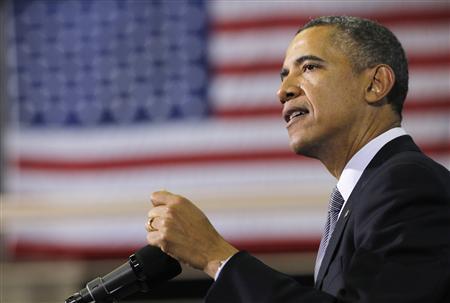(Reuters) – The White House on Wednesday proposed a budget that sharply trims the U.S. deficit over three years by forcing millionaires to pay more in taxes and enacting spending cuts that replace the “sequester” reductions that went into place last month.

President Barack Obama’s fiscal 2014 budget blueprint ensures that those making $1 million a year or more would have to pay at least 30 percent of their income, after gifts to charity, in taxes, officials said.
Obama is due to release his full budget at 11:15 a.m. EDT (1515 GMT) and to make remarks at that time.
The president’s budget stands little chance of being enacted into law. However, senior administration officials said that, in spite of Republican leaders’ resistance to tax increases, they hoped it could lead to a deficit reduction accord.
“There continue to be people who are on the Republican side … in the Senate at least, who are saying things that would give you some hope that there is a path to a deal,” a senior administration official told reporters.
The president is breaking from the tradition of using the largely symbolic budget release to outline his ideal tax and spending proposals. Instead, he is trying to relaunch talks to resolve a long-running fiscal battle with his Capitol Hill adversaries.
To do so, Obama is offering a concession that has enraged many of his supporters: adopting a less generous measure of inflation to calculate cost-of-living increases for the beneficiaries of many federal programs. One result would be diminished benefits for most recipients of the popular Social Security retirement program.
Although Obama has pledged to shield some of the most vulnerable beneficiaries, the proposal has drawn strong opposition from Democrats and groups representing labor and the elderly.
At the same time, his budget proposal faces seemingly insurmountable opposition from Republican leaders, who reject any new tax revenues.
Obama’s hope is to build a coalition of lawmakers willing to compromise, although most observers see that as unlikely. He has invited 12 Republicans to dinner at the White House on Wednesday in an effort to soften resistance.
“The question is, are Republicans going to be willing to come to us to do the serious thing that they say is so important in terms of reducing our deficit,” a senior administration official said in a conference call with reporters the day before the budget release.
Both sides are so dug that they were unable to prevent some $85 billion in across-the-board “sequestration cuts” from going into effect March 1.
Obama’s budget proposal would replace those cuts with his original deficit reduction proposal from December. That offer included $930 billion in spending reductions and some $580 billion in tax revenues.
The president’s budget includes spending on policy priorities such as infrastructure and early childhood education. He would pay for those programs with additional new taxes and the elimination of some tax breaks for the well-off.
The budget also includes a 10 percent tax credit for small businesses that raise wages or hire new workers.
The president’s advisers said the budget proposal would achieve $1.8 trillion in deficit reduction over 10 years. Added to the $2.5 trillion in deficit cuts from past efforts, the total would be above the $4 trillion reduction both Republicans and the White House have said would be an acceptable goal.
Obama’s budget is a clear contrast with a rival blueprint put forward by Representative Paul Ryan, the 2012 Republican vice presidential nominee and potential 2016 presidential candidate.
“You can invest in the middle class, create jobs, and reduce our deficits,” a senior administration official said. “We don’t have to choose between deficits as far as the eye can see and the sort of austerity that’s in the Paul Ryan budget.”
(Reporting By Mark Felsenthal; Editing by Doina Chiacu and Bill Trott)





